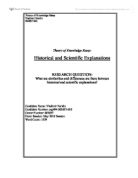“It is certain”, involves certitude in a proposition, like a thesis, statement, idea or, I may concept. For example it is certain that the sun will rise tomorrow, it is inevitable. The probability of the fact is one. It is relied on to happen.
To justify knowledge you need evidence in order to make people passionately believe in the knowledge. The stronger the evidence that the knowledge is the truth, the more people will be convinced and adopt the knowledge.
But is it something definitely known?
It is certain that I will die, since there is no proven elixir of life, and there is plenty of evidence that all organisms die eventually. Things that are inevitable are certain to happen. But can we say that every organism dies eventually is an absolute fact? Well so far we haven’t had anything living for more than 1000 years, but we have plants and animals as old as 200 years. We cannot predict that they will not go on living. So the statement contains a slight uncertainty, but not enough for us to reject it.
Scientists use experiments to increase their certainty in theorems. They attempt to produce facts that are absolutely true. However it is impossible to ensure absolute truth, so it just becomes an accepted truth to allow further scientific advancement. This is because the basic ideas are treated as fact, so that new theories can be built upon these axioms.
There is always some uncertainty in every statement. This is because we can’t predict the future or know every thing about the function of the universe.
Mathematics seems to be a subject with only one answer and a complete certitude.
But maths has theorems as well. To make sense out of maths we would use axioms. Axioms are a set of assumptions and you would choose your set of axioms in order to perform more complex calculations.
Therefore it is fine to make some assumptions in order to progress. It we didn’t believe anything unless it was 100% certain with strong evidence saying it the truth, we wouldn’t be able to develop. “There is no such thing as absolute certainty, but there is assurance sufficient for the purposes of human life" John Stuart Mill.
The fact that scientific facts aren’t absolute facts means that humans will keep questioning the idea and keep looking for a better explanation. This results in progress and an evolution of certainty. An example of passionate conviction is that for a while it was certain that the world was flat and the sun and moon revolved around the earth. People didn’t question this theory because it seemed obvious. But the scientist proved that the earth had a gravitational force, and it was possible for the earth to be round. Now it is certain that the earth is spherical and there are many ways to prove it.
Passionate conviction is a firmly held belief and may not be enough to justify the knowledge. For example a person may be passionately convinced that there is a god. But there is not enough evidence of there ever being a god. But god is used as a reason why. Why we exist, why we think, why there is a universes. These things we are also uncertain about. However for something to be an accepted truth or axiom, we need substantial evidence.
A proved chain of reasoning and accepted axioms therefore effectively establishes knowledge of truth.






